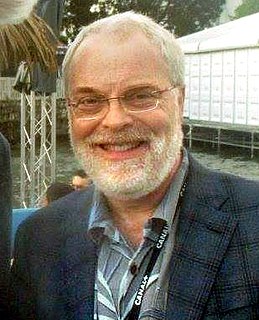A Quote by Kurt Vonnegut
He wanted to talk to them, if he could, to discover whether they had truths about life which he had never heard before. Here is what he hoped new truths might do for him: enable him to laugh at his troubles, to go on living, and to keep out of the North Wing of the Midland County General Hospital, which was for lunatics.
Related Quotes
It was possible, maybe, to have facts in your mind that weren't facts at all. You could build a whole life's story on false assumptions. You could make truths out of untruths and untruths out of truths. Until you spoke them, really said them out loud or checked for sure, you may not have known which were which.
The men loved jokes, though they had heard each one before. Jack's manner was persuasive; few of them had seen the old stories so well delivered. Jack himeself laughed a little, but he was able to see the effect his performance had on his audience. The noise of their laughter roared like the sea in his ears. He wanted it louder and louder; he wanted them to drown out the war with their laughter. If the could should loud enough, they might bring the world back to its senses; they might laugh loud enough to raise the dead.
He was about to go home, about to return to the place where he had had a family. It was in Godric’s Hollow that, but for Voldemort, he would have grown up and spent every school holiday. He could have invited friends to his house. . . . He might even have had brothers and sisters. . . . It would have been his mother who had made his seventeenth birthday cake. The life he had lost had hardly ever seemed so real to him as at this moment, when he knew he was about to see the place where it had been taken from him.
We really wanted someone from the culture to sort of do that. And we heard about Taika [Waititi]. We saw his movie Boy, which that he had directed and written and which was great. We read another one of his scripts that was great. And we brought him in, showed him what we were doing. He really liked the idea.
The basis of Ronald Reagan was his humanity. I might not have agreed with his politics, but my research - all I read about him and by him - was that he was revered because he had a big heart. He was very religious and sincere. He believed that one spoke truths because, otherwise, people would know you were lying. None of that even applies to Trump.
She rested her head against his and felt, for the first time, what she would often feel with him: a self-affection. He made her like herself. With him, she was at ease; her skin felt as though it was her right size.. It seemed so natural, to talk to him about odd things. She had never done that before. The trust, so sudden and yet so complete, and the intimacy, frightened her.. But now she could think only of all the things she yet wanted to tell him, wanted to do with him.
There are certain truths which stand out so openly on the roadsides of life, as it were, that every passer-by may see them. Yet, because of their obviousness, the general run of people disregard such truths or at least they do not make them the object of any concious knowledge. People are so bliend to some of the simplest facts in everyday life that they are highly surprised when somebody calls attention to what everybody ought to know.
What a man does, that he has. What has he to do with hope or fear? In himself is his might. Let him regard no good as solid but that which is in his nature, and which must grow out of him as long as he exists. The goods of fortune may come and go like summer leaves; let him scatter them on every wind as the momentary signs of his infinite productiveness.





































